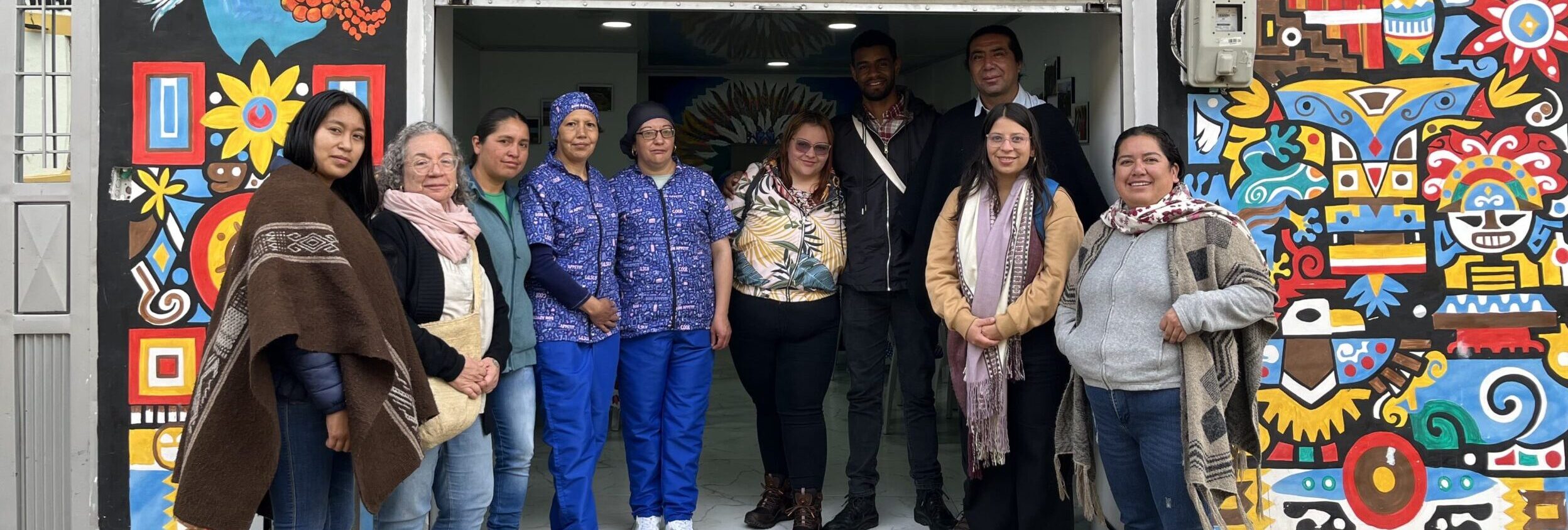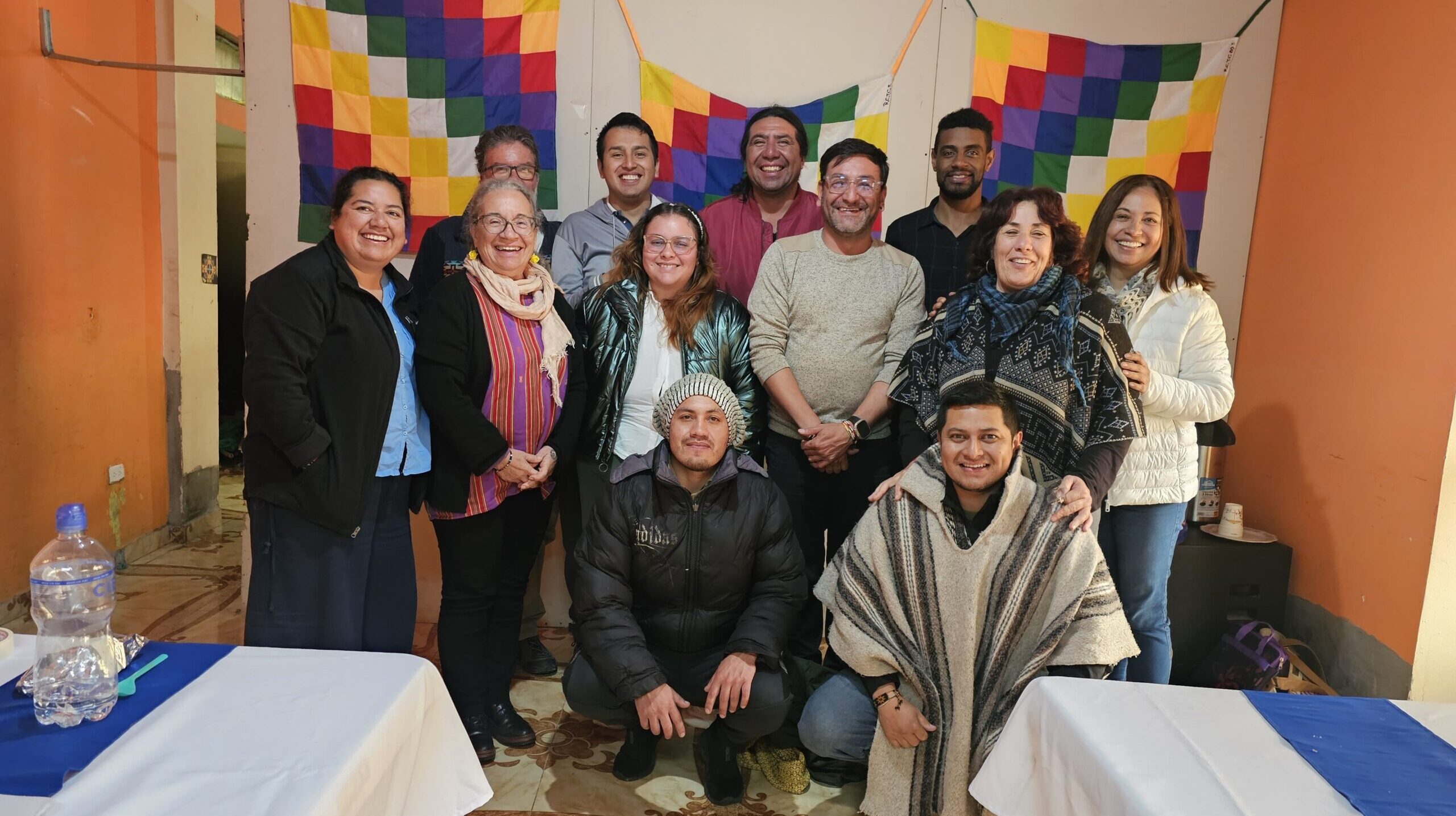Weaving Transformative Resilience and Active Hope: An Alliance in the Face of Climate Change in the Gran Tescual Indigenous Reservation
The inclusion of Indigenous Peoples is essential to protecting global biodiversity and is central to GCBC’s mission of advancing climate resilience through nature.
Colombia, one of the world’s most biodiverse countries, harbors around 10% of global biodiversity within just 0.7% of Earth’s surface. With ecosystems under growing threat, the sustainable stewardship of Indigenous territories, rooted in Indigenous knowledge, leadership, and rights, is crucial to safeguarding both ecological and cultural heritage
Corporación CIASE, in partnership with the Gran Tescual Indigenous Reservation of the Pasto People, is leading a research initiative to protect local ecosystems, enhance community well-being, and support biodiversity conservation. A recent key output of the project, the Illustrated Botanical Guide to the Gran Tescual Reservation, documents the region’s rich plant diversity and presents ancestral knowledge as a valuable resource for education and conservation.
To mark the International Day of the World’s Indigenous Peoples and to celebrate the guide’s release, CIASE members have contributed a special article, reflecting on their collaboration with the Pasto community and the role of ancestral knowledge in shaping inclusive, sustainable climate action.
…………………………………………………………………………………………………………………
The following article was written for GCBC by Corporación CIASE.
In today’s world, increasingly affected by the accelerating climate crisis, there is an urgent need to seek collective paths that challenge excessive consumerism, while teaching us about care and empathy for the world’s finite natural resources.
The alliance in Colombia between Corporación de Investigación y Acción Social y Económica (CIASE)—a feminist and mixed-gender organisation—and the Pan-Amazonian Indigenous Reservation of Gran Tescual, inhabited by the Pasto people, forms part of this collective search. This alliance has been consolidated through years of equitable collaboration and the implementation of various initiatives, the most recent being the development of the Climate Plan for the Reservation.
In this process, research oriented towards biodiversity protection and the integration of Indigenous knowledge to preserve biocultural heritage (see The Botanical Guide of the Gran Tescual Resguardo) has opened space for reflections on the safeguarding of strategic ecosystems such as the páramo (high treeless plateaus), food sovereignty, and gender dynamics.


Image 1 shows women from the Pasto community outside their restaurant initiative in the resguardo, with Daniela Torres, Mama Genith Quitiaquez, Taita Vicente Obando, Ricardo Ibarguen, Wendy Toro and Rosa Emilia Salamanca from Corporación de Investigación y Acción Social y Económica (CIASE). Image 2 shows the full CIASE team: Mama Genith Quitiaquez, Rosa Emilia Salamanca, Wendy Toro, Germán Niño (behind) Fredy O Chávez, Taita Vicente Obando, Angel E Gamboa, Patricia Luli, Ricardo Ibarguen, Maria Cristina Umbarila and Felipe Imbacuan.
Indigenous knowledge and feminist perspectives can walk together and contribute to building futures that are more just, more inclusive, and, above all, allow such transformations to become more embedded in the daily lives of communities.
— Wendy Toro, CIASE Researcher
Extractive industries, agricultural expansion, megaprojects and internal armed conflicts in our country have been historical obstacles to ensuring the quality of life for communities facing multiple forms of exclusion—such as Indigenous peoples, women, and others whose identities have been placed in positions of denial and oppression.
This unfolds within a broader context shaped by Western modernity, which has influenced how we relate to and make sense of the world. These ways of thinking have also informed scientific approaches, which, have at times led to an instrumental perspective on the environment, where everything is seen as a resource.
It is at this juncture that CIASE’s approach centered on gender justice and the Indigenous knowledge of the Pasto People interweave to form an inspiring proposal. In order to understand the roots of today’s climate crisis, this alliance brings the gender–environment intersection to the forefront.
It raises fundamental questions: To what extent does the association of weakness with the feminine—viewed as something to be possessed—sustain and justify violence against women and, to a large extent, against nature? And how does the notion of masculinity as a dominant and possessive force reflect itself in the extractive practices that destroy and exploit vital ecosystems? [1]
Feminism still feels like a somewhat foreign approach. In the Pasto community, it’s often mocked or seen as a loss of manhood—as if men are being feminised. [However], through the feminist lens, we’ve begun to raise awareness about economic mistreatment, and I find it quite striking how an approach like this can bring about transformation and change.
— Taita Vicente Obando, Indigenous Governor of Gran Tescual
Promoting women's participation isn’t just about creating a space for women—it’s about creating a better environment for the entire community. And in that sense, feminism can say: this is not only a struggle for women, it is a struggle for society as a whole.
— Mama Genith Quitiaquez, Authority of Gran Tescual
This experience has also been a space where everyday encounters and practice challenge the illusion of objectivity and the idea of a single truth. It demands situating knowledge, decolonising research processes, and recognising the legitimacy of Indigenous self-governance. This has allowed for mutual curiosity and learning, enabling the weaving of life experiences and knowledge towards a heartfelt construction of peace within the Colombian context—through active listening.
The synergy of knowledge systems, perspectives, and identities—even those within a single person—resonates with the relationship between the Andean and Amazonian ecosystems that converge in the Gran Tescual Reservation. From this interaction emerges abundant biodiversity and essential ecological processes that maintain the balance and vitality of both regions.
The Indigenous knowledge of the Gran Tescual Reservation offers a deeply relational vision, where spirituality, community and territory are inseparable.
— Daniela Torres, Climate Advocacy Specialist at CIASE
The relationship between CIASE and the Gran Tescual Reservation is not a mere coming together of good intentions – it is a novel construction between differences. Here, the “quality of the relationship” becomes the foundation for facing complex challenges of cultural transformation. This collaboration goes beyond technical support; it is based on building mutual trust through dialogue, and for that to happen, both parties have shown a necessary openness.
“Transformation also entails a reworking of everyday and family realities, and that, in turn, shapes how we relate to the territory.”
— Felipe Imbacuan, Researcher from the Pasto People and Municipal Councillor of Puerres
This alliance offers a viable and proactive proposal for addressing the changes brought by the climate crisis from a deeply rooted ethnic and gender analysis—perspectives that challenge historical logics and cultures of discrimination, while calling for the recovery of ancestral thought as a path to restoring the territory.
“This initiative is a powerful and promising pathway to transform power relations in an integral way. It helps build shared visions of peace and drive a deep cultural shift. It is an undeniable intercultural dialogue that weaves together the heart of feminism—one that rejects all forms of discrimination and oppression—with the Indigenous vision of harmony and care for nature and the people who inhabit it, so central to the spirit of Colombia’s Indigenous peoples.”
— CIASE’s Centre for Thought (Patricia Luli and Rosa Emilia Salamanca G.)
Endnote
[1] Questions we have taken from classical ecofeminism.
References
CIASE (2025). Recuperar el pensamiento, restaurar el territorio: Diagnóstico participativo de biodiversidad y medios de vida del resguardo El Gran Tescual. CIASE
Brigitte Baptiste-Ballera (2025). TransEcología: Una guía patafísica para habitar las transformaciones del mundo. Ariel.
Maristela Svampa (2015). Feminismos del Sur y ecofeminismos. Recovered from: https://nuso.org/articulo/feminismos-del-sur-y-ecofeminismo
Discover More: Gran Tescual Indigenous Reservation Climate Plan


